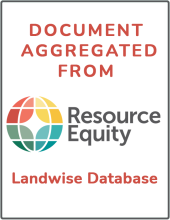Land Library
Welcome to the Land Portal Library. Explore our vast collection of open-access resources (over 74,000) including reports, journal articles, research papers, peer-reviewed publications, legal documents, videos and much more.
/ library resources
Showing items 1 through 9 of 90.The authors address questions such as: (1) how do parents allocate land and education between sons and daughters? (2) how do changing returns to land and human capital affect parents' investments in children?
Agricultural growth will prove essential for improving the welfare of the vast majority of Africa’s poor. Roughly 80 percent of the continent’s poor live in rural areas, and even those who do not will depend heavily on increasing agricultural productivity to lift them out of poverty.
This brief considers the benefits and costs of alternative tenure and institutional arrangements and the impact of existing legal and policy frameworks on the sustainability and equity of pastoral production systems under three categories of landownership: (1) state ownership; (2) individual owne
This paper analyzes the impact of land titling on child health and education in Argentina.
Governments are now shifting their role from direct management of irrigation systems to regulation of the water sector, provision of support services to water user associations, and capacity building among water user associations and irrigation service providers....
This report has very focused objectives. It seeks to present the methodology and results of the poverty analysis of the 2002-03 IAF as well as comparisons with the 1996-97 survey results. The results point to a substantially improved poverty picture relative to 1996-97.
Based on travel to diamond fields in Guinea, Sierra Leone, Angola and the DRC, the study examines the reality on the ground.
Local entrepreneurs drive development in deprived neighbourhoods. Small-scale actions – rather than abstract urban planning by officials – are most effective.



